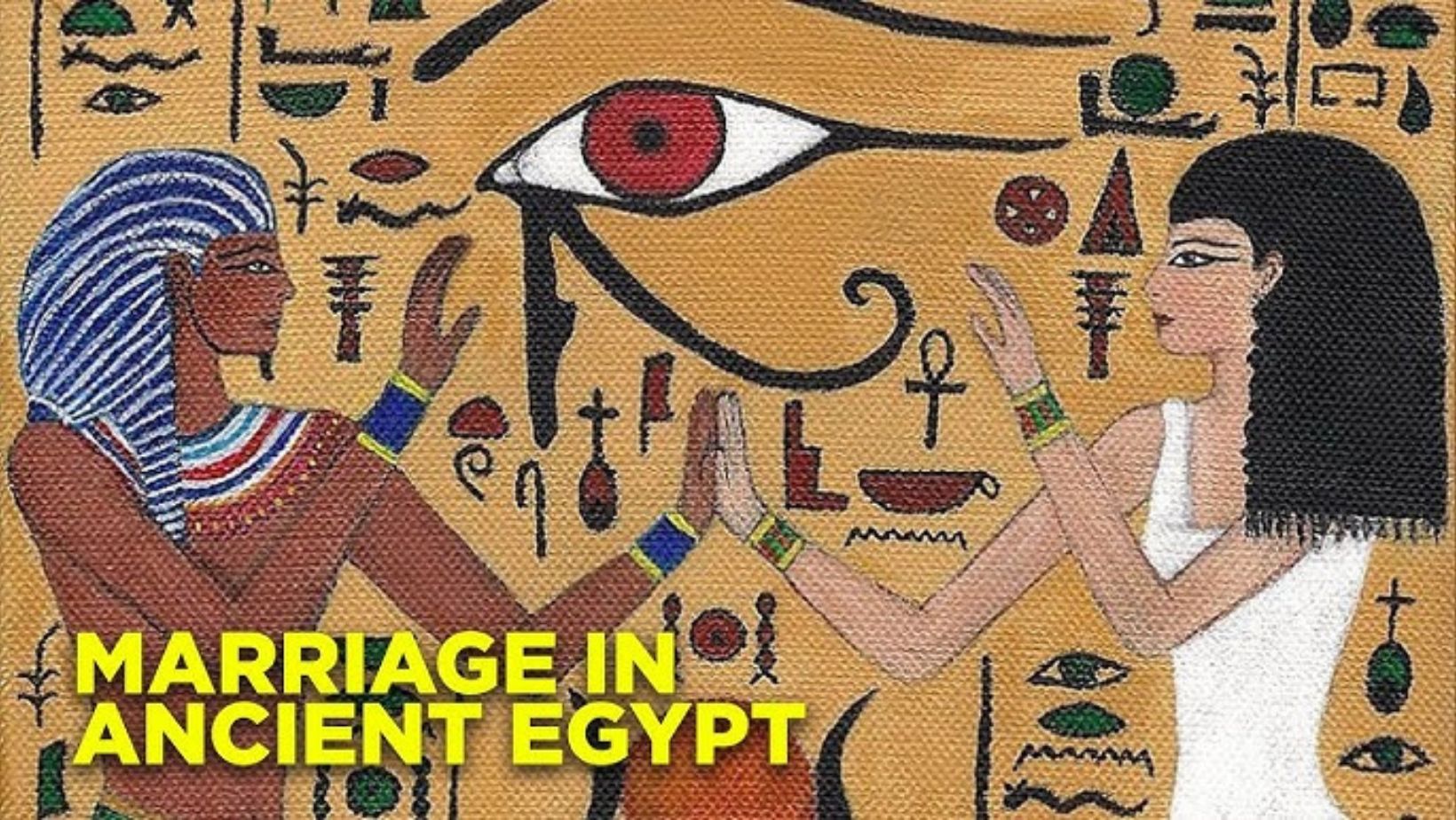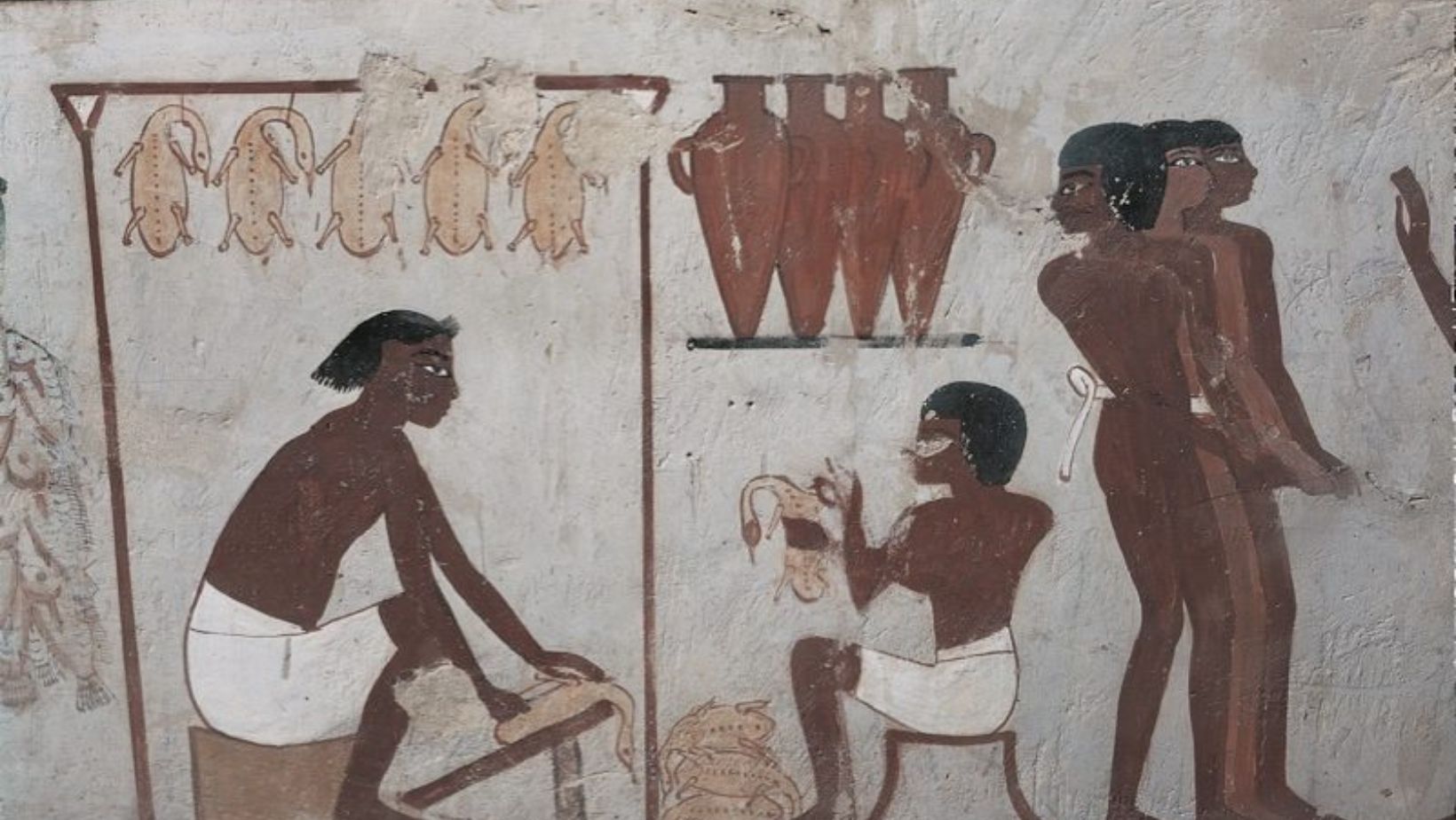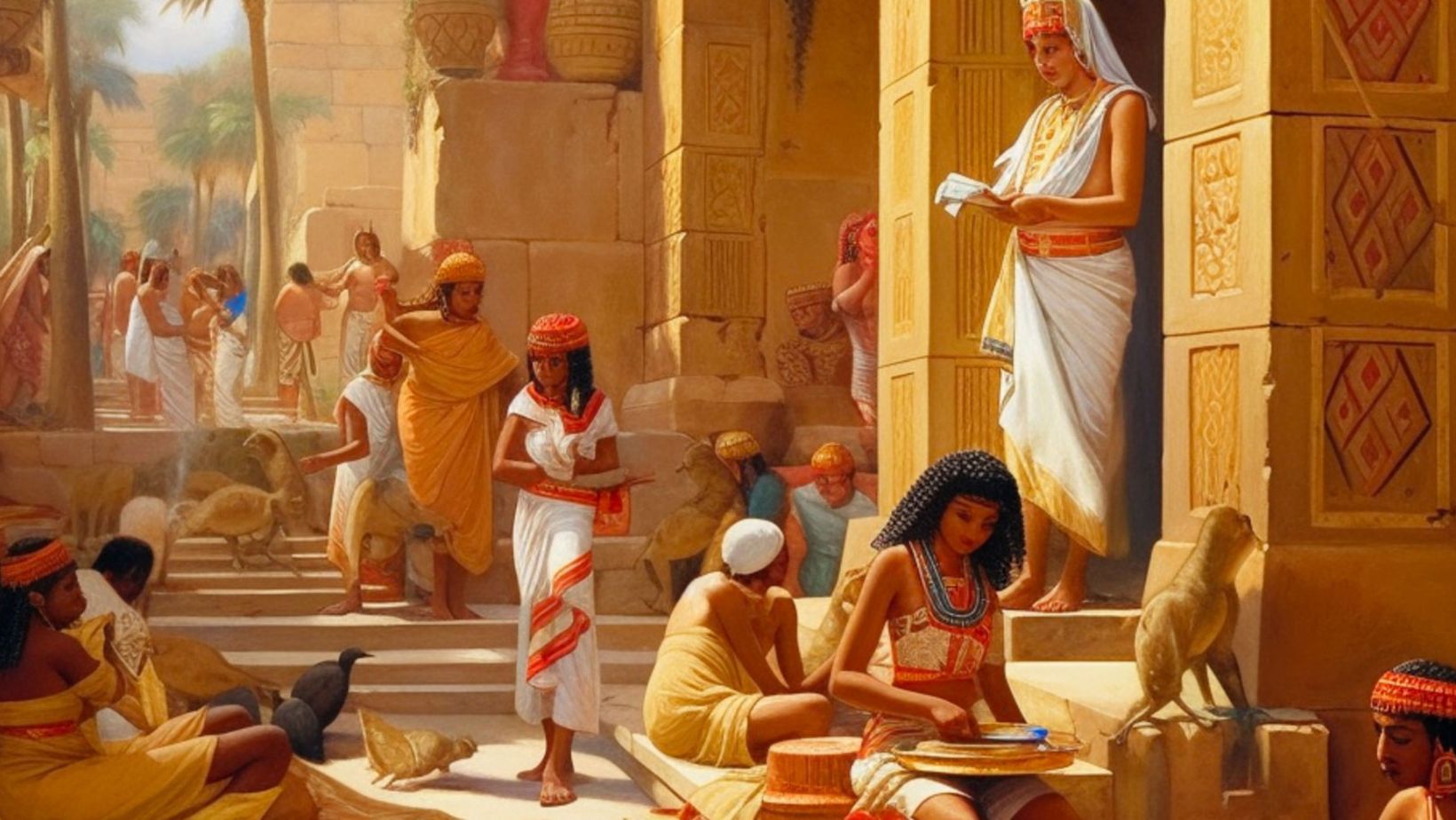In ancient Egypt, family was everything. It formed the very heart of society, shaping everyday life and beliefs. Egyptian family have a sacred bond, one that extends beyond just parents and children. It included grandparents, aunts, uncles, and even ancestors. Each member played a unique role, contributing to the family’s well-being and legacy. Parents were responsible for guiding and nurturing, while children were expected to honor and care for their elders. These relationships were more than just connections—they were duties. In this way, family roles in ancient Egypt weren’t just about love; they were about respect and responsibility.
Marriage in Ancient Egypt: A Social Foundation of Egyptian Family

Marriage in ancient Egypt was a vital institution that upheld social structure and stability. It was more than a personal commitment; it served as a cornerstone for family continuity and social harmony. Egyptians viewed marriage as essential for building a household and establishing family alliances, which often helped strengthen social or economic ties. The union also allowed for the continuation of family lineage, an important aspect of Egyptian beliefs about the afterlife. Egyptian Family
Typically, ancient Egyptians married young, with girls around 12-14 and boys in their late teens. Arranged marriages were common, often decided by the families, although individuals could sometimes choose their partners. Marriages were primarily monogamous, though some men, especially royalty, had multiple wives for political alliances or heirs. There was no formal marriage ceremony; instead, couples simply moved in together, which was seen as an official union. Egyptian Family
Egyptian marriage was rooted in mutual respect and practical benefits. The marriage contract, though informal, included expectations for both partners, like inheritance rights and financial support. Divorce was relatively easy and could be initiated by either partner, though it was not common. Marriage in ancient Egypt thus provided social security and reinforced the cultural value placed on family and continuity.
Types of Marriages: Love, Alliance, and Royal Connections in Egyptian Family
Marriages have taken many forms throughout history, each with distinct purposes and societal impacts. Love-based marriages are primarily centered on personal choice and emotional connection. Couples marry for companionship and affection, often seen as a celebration of personal happiness. In contrast, alliance-based marriages are strategic unions arranged by families, typically for social, economic, or political benefit, binding two parties to strengthen social ties or business ventures.
Royal marriages, however, take alliance marriages to another level. These unions often serve as political tools, aiming to secure power, wealth, and peace between nations. Marriages between royal families could prevent wars or unite powerful kingdoms, showcasing how matrimony could impact entire empires. While love sometimes played a part, royal marriages were often driven by duty, with heirs and alliances prioritized over romance. Egyptian Family
Each type has shaped societies differently. Love-based marriages support individual choice, giving more freedom to personal desires. Alliance-based marriages reinforce family bonds and create influential social networks. Royal marriages wield the highest stakes, with their influence extending beyond personal lives to shape history through political and dynastic stability. Egyptian Family
Marriage Contracts and Dowries in Egyptian Family: A Binding Agreement
Marriage contracts were essential in many cultures, serving as formal agreements that defined the rights and obligations of both spouses. These contracts outlined financial arrangements, inheritance rights, and roles within the marriage. In ancient civilizations, they also protected the rights of women, providing security in case of separation or death. These agreements acted as binding documents, ensuring both families understood the terms of the marriage.
Dowries were commonly included in marriage contracts, where the bride’s family provided assets to support the new household. These gifts often consisted of land, money, or valuable items and served as a form of financial security for the bride. The groom’s family might also present gifts, symbolizing goodwill and commitment to the union. Dowries strengthened alliances between families, reinforcing the marriage as both a personal and social contract. Egyptian Family
Dowries and marriage contracts had economic and social significance, shaping family alliances and inheritance. They symbolized stability, helping to ensure that families stayed bound even during challenges. These traditions, still practiced in parts of the world, highlight how marriage has long been a blend of personal ties and social agreements. By defining clear roles, contracts and dowries set expectations and safeguarded the interests of both partners. Egyptian Family
Roles of Husbands and Wives in Egyptian Family and Society

In ancient Egypt, the roles of husbands and wives were defined by social expectations and cultural traditions. Husbands were typically the head of the household, responsible for providing for the family and ensuring its well-being. They held authority in the family, made major decisions, and were often involved in public affairs. Egyptian men were expected to protect their families and manage finances, but they were also expected to show kindness and affection toward their wives.
Wives in ancient Egypt played a crucial role in managing the household and ensuring its smooth operation. They were responsible for domestic duties such as cooking, weaving, and raising children. Wives were also actively involved in religious life, often serving as priestesses in temples or participating in rituals. While the husband’s authority was dominant, wives had significant influence in family matters and were respected for their contributions to both the home and society.
Children and Inheritance: The Importance of Offspring in Egyptian Family
In many cultures, children were essential in inheritance matters, particularly sons. Sons were often seen as the primary heirs, responsible for continuing the family name and managing the family’s wealth. The desire for male offspring was especially strong in patriarchal societies, where sons inherited property, titles, and land. This preference ensured that the family legacy was passed on through generations.
Inheritance was typically passed down from parents to children, with the eldest son often receiving the largest share. This system, known as primogeniture, ensured the continuity of family wealth and power. In some cases, daughters could inherit, but their share was often smaller or conditional, depending on local customs. Inheritance laws were key to maintaining social status and securing the family’s future.
As societies evolved, the importance of children in inheritance shifted in some places, giving rise to more equal rights for daughters. However, the desire for children, particularly male heirs, continued to influence inheritance laws for centuries. Even today, the role of offspring in passing down family wealth and traditions remains a significant part of many cultures worldwide.
Inheritance Laws and Practices in Ancient Egyptian Family
In ancient Egypt, inheritance laws were crucial in maintaining family wealth and property. The primary principle was that property passed down from father to children, typically to sons. Women, however, could inherit property but usually only if no sons were available. This system ensured that wealth remained within the family, helping maintain social status.
When it came to gender, sons were generally the primary heirs. In cases where a man had no male children, daughters could inherit, but often under conditions that ensured male relatives or guardians managed the property. Women had the right to own and control property, including land and goods, but were restricted in certain aspects of inheritance, particularly in terms of larger estates.
Dividing assets in ancient Egypt also depended on the family’s structure. The eldest son often received the lion’s share of the inheritance, while other sons and daughters received smaller portions. The laws favored the preservation of wealth within the family unit, with inheritance practices often enforced by legal documents, such as wills or contracts.
Overall, Egyptian inheritance laws aimed to preserve family wealth while ensuring that both male and female heirs had a defined role in managing or inheriting property.
Extended Egyptian Family and the Role of Kinship
In many cultures, extended families play a crucial role in supporting individuals. Grandparents, uncles, aunts, and cousins often form a close-knit network of care. These family members provide emotional, financial, and social support to each other, creating a stable environment. They share responsibilities in raising children, offering guidance, and maintaining traditions.
Grandparents often have a special bond with their grandchildren, offering wisdom and experience. Uncles and aunts also contribute by providing mentorship and assistance when needed. These extended family members step in during times of crisis, such as illness or financial difficulties. Their involvement helps ensure that no family member faces challenges alone.
Kinship also offers a sense of security that strengthens social ties. It fosters a sense of belonging and emotional well-being. In many societies, the extended family system is vital for the survival of cultural practices and values. This interconnectedness builds resilience within the community.
Ultimately, the extended family serves as a support system that goes beyond the nuclear family. By relying on each other, families are better equipped to navigate life’s challenges. Their role is essential in maintaining both individual and collective stability.
Divorce and Remarriage: Social Acceptance and Process
In ancient Egyptian society, divorce was relatively common and accepted. It could be initiated by either the husband or wife, though men had more legal rights in this area. A simple declaration was enough to end a marriage, and both parties were free to remarry. Egyptian law recognized the importance of fairness in divorce, particularly regarding property and children.
Remarriage after divorce was socially accepted and often necessary for economic stability. Women could remarry, but their new husbands did not automatically gain control over any assets they inherited. Inheritance laws ensured that children from previous marriages were not overlooked. For men, remarriage could strengthen their social and economic standing, especially through alliances.
Divorce and remarriage influenced social roles in Egypt, especially regarding family structure. Women, though often expected to care for children, could maintain a degree of autonomy. Men, however, had the privilege of marrying multiple women and consolidating wealth through successive marriages. Both divorce and remarriage were seen as part of the natural flow of life, without significant stigma attached.
Women’s Rights and Property Ownership in Egyptian Society
In ancient Egypt, women enjoyed unique legal rights, especially regarding family and property. They had the right to own, inherit, and manage property, making them relatively empowered in comparison to other ancient societies. Egyptian women could act as legal guardians for children, enter contracts, and even represent themselves in court. These rights allowed women to play a key role in managing wealth and assets.
One notable example is the priestess and landowner, Merit, who managed a large estate in Thebes. She was granted land and could pass it down to her heirs, demonstrating how women could maintain and grow their financial independence. Another example is the widow of a wealthy official, who took over her husband’s estate after his death, continuing to manage property, assets, and even legal affairs. These women’s stories reflect the relatively advanced legal framework of ancient Egypt, where women could wield significant control over their economic lives.
Social Classes and Family Life: Nobility vs. Commoners
Family life in historical societies varied greatly between the nobility and commoners. Nobles typically lived in grand estates, where family roles were clearly defined by status and wealth. Marriage among nobles was often arranged for political or financial gain, with little regard for personal choice. Nobles had the luxury of leisure and education, while commoners focused on survival and daily labor.
In contrast, commoner families lived in modest homes and worked long hours to support themselves. The family structure was more flexible, with children often involved in work from a young age. Marriage among commoners was based more on personal choice and practical concerns, such as agriculture or trade. Family roles in commoner households were rooted in necessity, with everyone contributing to the household’s well-being.
Noble families had servants, and their children often received private tutors. They had the time and resources to pursue intellectual and cultural pursuits. In comparison, commoner families were focused on physical labor and passing down trades or skills. While nobles could afford luxury, commoners’ families worked together to ensure survival.
Religious Beliefs and Family Duty in Daily Life

Religious beliefs have played a significant role in shaping family roles and duties throughout history. In many cultures, religion dictated specific roles for family members, often emphasizing obedience, respect, and hierarchy. The head of the family, typically the father, was seen as the spiritual guide, ensuring that religious practices were followed. Women were often tasked with maintaining the household’s spiritual rituals, fostering a strong connection between faith and daily life.
Family duties were deeply intertwined with the belief in the afterlife. Many religious traditions held that how one fulfilled family responsibilities impacted their fate after death. In ancient Egypt, for example, honoring parents and ancestors was crucial for a favorable afterlife. Similarly, in Christianity, the duty to care for one’s family was seen as a way to earn divine favor and secure a place in heaven.
In many societies, children were taught religious values from a young age, preparing them for both earthly and spiritual duties. These values influenced their roles within the family and the community, creating a moral framework for behavior. Ultimately, religious beliefs and family duties were inseparable, with each shaping the other in the pursuit of a meaningful life and a hopeful afterlife.
Conclusion: Egyptian Family
The legacy of Egyptian family life reveals a unique structure where family was the core unit of society. The strong bond between parents and children, along with the emphasis on respect for elders, played a vital role in shaping Egyptian culture. Marriages were often seen as partnerships for stability and prosperity, while children’s roles were seen as a continuation of family traditions. This structure influenced Egyptian society by ensuring social order and passing down knowledge and values through generations. Ultimately, the family was the foundation of Egyptian society, preserving culture, religion, and economy for centuries.
FAQs
What was the role of women in ancient Egyptian marriage?
Women in ancient Egypt held significant roles within marriage. They managed household affairs, raised children, and had legal rights, including owning property and making contracts. While marriages were typically arranged, women had the right to divorce and maintain their own wealth after marriage.
How were inheritance rights determined in ancient Egypt?
Inheritance in ancient Egypt was generally passed down through the male line, with sons inheriting property, titles, and wealth. However, women could also inherit property, especially in the absence of male heirs. The inheritance system was governed by a combination of royal laws and family traditions.
What were the social roles of men and women in ancient Egyptian families?
Men were typically the breadwinners, holding roles as farmers, craftsmen, priests, and officials. Women managed the household, raised children, and oversaw domestic duties. While men were seen as the heads of the family, women had respected roles in religious, economic, and familial matters.
Did Egyptian marriages always include a formal ceremony?
Marriage in ancient Egypt did not always require a formal ceremony. Often, a couple would simply move in together and declare their union publicly. Legal documents, like marriage contracts, were sometimes used to outline rights, especially in cases of inheritance or property disputes.
How did family structures affect ancient Egyptian society?
Family life was at the core of ancient Egyptian society, with the nuclear family being the foundation of social order. Family relationships governed inheritance, social standing, and responsibilities. Strong family ties ensured the continuity of traditions, religious practices, and property across generations.

